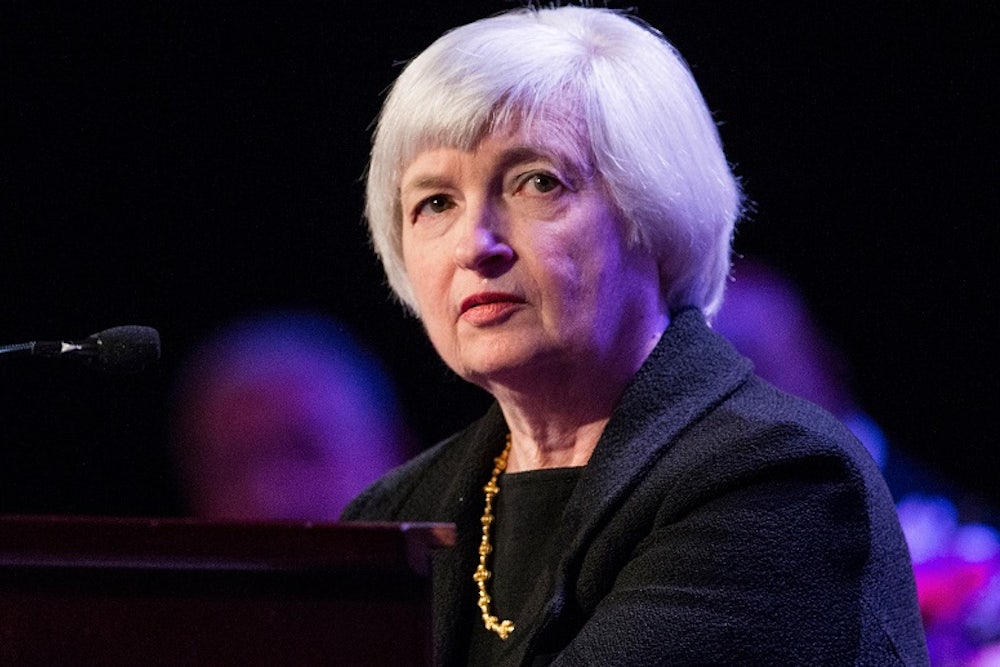Throughout her first four-plus months as chair of the Federal Reserve, Janet Yellen has said all of the right things. She expressed significant concern about the fate of the long-term unemployed and did not overreact to weak first-quarter growth, a result of an unusually cold and nasty winter. But despite her strong rhetoric, Yellen hasn’t had to lead the Federal Open Market Committee (FOMC) through any big decisions.
That will change soon, as Yellen must decide when the Fed will raise interest rates above zero for the first time since 2009. Raise them too soon, and it will choke off the recovery, denying wage growth for workers who have seen their wages stagnate for the past 15 years. Raising them too late, on the other hand, could lead to a bit of excess inflation.
During the weak recovery, many on the right repeatedly warned that inflation was around the corner. “We can expect rapidly rising prices and much, much higher interest rates over the next four or five years,” Art Laffer, who was an economist in President Ronald Reagan’s administration, wrote in 2009, “and a concomitant deleterious impact on output and employment not unlike the late 1970s.” In April 2009, the top White House economist under President Reagan, Martin Feldstein, wrote, “The link between fiscal deficits and money growth is about to be exacerbated by 'quantitative easing,' in which the Fed will buy long-dated government bonds.”
But Laffer and Feldstein, among others on the right, have been completely wrong about inflation. It has been well-below the Fed’s 2 percent target for years now:

That hasn't stopped Feldstein from warning, on June 9, “Inflation is rising in the United States and could become a serious problem sooner than the Federal Reserve and many others now recognize.” He isn’t totally wrong this time. Inflation has ticked up in recent months. On Tuesday, the Bureau of Labor Statistics announced that the consumer price index had risen 2.1 percent in the past year. The Fed’s favorite inflation measure—known as the PCE Deflator—is up 1.6 percent year-over-year. The core PCE Deflator, which excludes food and energy prices to reduce volatility, is up 1.4 percent in the past year.
This is where Yellen’s job becomes toughest. Fearing 1970s-level inflation, these inflation hawks are going to demand that the Fed raise interest rates in the near future. But the Fed’s current forecasts project that the first rate hike will not come until 2015. The market, meanwhile, does not expect the first rate hike until the summer of 2015. If the Fed critics are already out now, just think how loud they will be a year from now.
It would be a huge mistake for the Fed to prematurely raise rates. A new report from the Economic Policy Institute titled “Raising America’s Pay” finds that wage growth for the bottom 20 percent of hourly workers was -0.4 percent per year from 2000 to 2013. For the bottom 50 percent, it was just 0.1 percent per year. In other words, for half of Americans, their wages have been nearly stagnant.
But just as we have seen hints of slightly higher inflation in the past few months, we have also seen anecdotal evidence of slightly higher wages. A major staffing agency for temporary workers, Robert Half International, recently increased their rate 2.6 percent, a sign that workers are both scarcer and in higher demand. Business Insider’s Joe Weisenthal also reports on two other indicators—the job opening rate and a survey of businesses that intend to increase compensation in the next three months—that suggest wage growth may be around the corner.
But it hasn’t materialized yet. Jared Bernstein, the former chief economist to Vice President Joe Biden, created a compilation of five different wage indicators that represent different parts of the economy. He found that real wage growth is still non-existent:

Yellen must ensure that the FOMC allows wage growth to happen before raising rates. If she hints that rate hikes could come sooner than expected—by warning about the threat of inflation, for instance—the market will internalize that message and choke off the recovery. And workers will once again find themselves stuck with stagnant paychecks.
